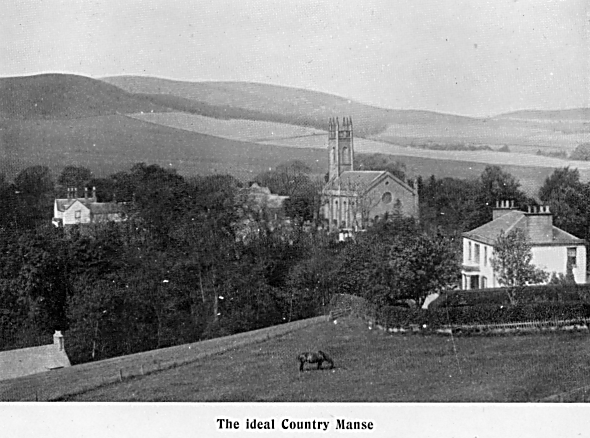In the fifties and early
sixties we spent most of our holidays under the roof of a kind grandmother
near Aberdeen, and this was always hailed as a blissful release from the
monotony of strenuous school life in Glasgow. A warm welcome awaited us, not
from relatives only, but from millers, fishermen, and retainers generally,
each of whom was a personal friend.
In those days, however,
travelling north was a serious undertaking. Through trains were undreamed
of. Locomotion had not yet consolidated into trunk lines. The long journey
could only be accomplished in three distinct stages. Burrowing out of St.
Mungo's city by the old Edinburgh and Glasgow Railway, at
Greenhill Junction we were called upon to change carriages. At this point
the Scottish Central was ready to pick up wayfarers and convey them as far
as Perth. Here an hour or two's delay had to be put up with, though, with
the optimism of youth, I think we reckoned this an advantage. Did it not
afford opportunity for perambulating The Fair City and its historic Inches,
of which we had learned something at school; or even for the ascent of
Kinnoull to view the windings of the Tay as it swept towards Dundee? Having
satisfied these worthy ambitions, we proceeded to take seats in a Scottish
North-Eastern train, which by-and-by slowly jolted along, stopping at every
wayside station, till at last we were deposited a mile or so short of the
present spacious terminus of the Granite City. The carriages then provided
for third-class passengers were little better than cattle trucks, being
extremely cramped, bare- boarded, and guiltless of springs, while the
Cimmerian darkness of the Moncrieff tunnel was only rendered more dismal by
the evil-smelling flicker of an oil lamp. The tiny windows did not open and
were too high up for kiddies to look out at' while couplings and brakes
acted un- certainly. Luggage was lashed to the top of the carriages, under
the eye of the guard who sat in a lofty perch. One wretched journey on the
Scottish Central section I remember particularly when we were compelled to
sit on a narrow bench faced by a dead wall, while the carriage, which
happened to be in the rear, swung about dangerously. On certain days, owing
to steamer competition, it was actually cheaper to make a detour by
Edinburgh, entailing an additional long halt there. Once we adopted this
circuitous route, and so it came to pass that my first introduction to the
Capital is associated with a terrific conflagration then raging in one of
the loftiest tenements of the High Street, which we viewed from the safe
terrace of Princes Street Gardens.

This tedious journey
accomplished, we entered upon a land of pure delight. The snell air of
Aberdeenshire speedily quickened the pulse and brought colour to the cheek,
renewing energy and summoning dormant faculties into being. There were
plenty of gooseberries in the garden, unlimited bathing in the North Sea,
shrimping in the tidal pools, and line-fishing at Don-mouth. There were
ideal evening cruises in the " Hyperion," under the guidance of our uncle,
John F. White, afterwards the well-known art critic and collector, through
the deep shadows and weird echoes of the Brig o' Balgownie, and then away
out to sea if conditions were favourable; with other rowing possibilities in
the upper reach between St. Machar's "twin-spired hoary Cathedral" and the
mills of Grandholm. There was the annual examination of the local Dame
school what time a friendly visitor could be persuaded to put a few
questions (amended to suit the weaker capacities by the mistress herself),
followed by a simple treat to the little ones at Braehead. There was an
occasional breakfast at the Greek Manse where we were mildly put through our
facings before being introduced to some of the arcana of King's College,
under whose noble crown we passed with becoming awe. There was the ever open
door of the motherly grand-aunt whose welcoming words were "Ilka man his
penny!" and whose stirrup cup was a trumpet-shaped glass of delicious
custard liberally dusted with fragrant cinnamon. There was cricket on "The
Island," castle-building on the sea-shore, and sand-milling in the "Dead
Woman's Hole." There were prowls by Chanonry, "the Alton," Firhill Well and
along the Spital, usually winding up, on a Friday, with a visit to the New
Market, always redolent of sweet-william and strawberries, of dried
spoldings and live crabs, and resonant with caller Doric mingling with the
rhythmic splash of its granite fountain.
To secure full liberty for
those revels it behoved us to be mindful of our p's and q's, and to keep
within somewhat Spartan law. It was generally believed that Grandmother had
eyes in the back of her head, and a small brother was actually discovered
looking for them as she lay on the sofa! Were we amusing ourselves in front
of the house, she would be seen looking out of an attic; were we wandering
round the back her voice would be heard from the pantry window; were we
disporting ourselves on the grass we were warned that it was wet; were we
racing on the walks we would be reminded that they were newly raked; were we
tobogganing down the avenue in a home-made "Tally-ho," we would be adjured
to remember the flower border; did we take refuge in the public road an
admonition would reach us from the terrace that this was neither respectable
nor safe. I once came in for undeserved disfavour for having turned out a
delectable mud-pie from my barrow liberally garnished with green currants.
The sin, as I now understand it, lay not so much in collecting the unripe
berries as in the danger of tempting myself or others to eat them!
With equal culpability a
younger brother got himself into dire disgrace through the faulty logic of
those in authority. He had been observed swinging a skipping-rope in the
vicinity of some photographic plates which were being exposed. One of these
was found cracked—ergo he had done it! Denial was held to be an aggravation,
and he was relegated to durance vile. Later in the day it was discovered
that other plates had gone in the same way. Then the truth leaked out. It
was the excessive heat of the sun that had wrought the mischief; but mean-
time the extreme penalty had been endured, and there was but scanty redress.
Thus we now and then found ourselves in tight places, yet there were many
compensating shillings, and surprising treats thoughtfully planned for us
largely at the in- stance of an understanding and unselfish aunt whose
memory we rightly cherish. Picnics would be arranged to Cove or Muchalls,
giving opportunity for the study of marine life at first hand, and winding
up with a salmon tea at the inn. We might find ourselves included in an
excursion to Benachie, at the back of which "Gadierins," or, best of all, we
might be carried off for a fortnight to Braemar—an experience never to be
forgotten. The journey up Deeside had then to be made entirely by coach from
Banchory, and the very names of Ballochbuie, Garrawalt, Ballater and
Balmoral seemed to blend in a distinctive harmony.
Nor was our intellectual
improvement for a moment lost sight of. One year the rudiments of botany
were imparted on the moorland by Alexander Cruickshank, son of the learned
mathematical professor.
Another year "Paradise Lost" formed the subject of minute analysis by a
gifted brother of the late revered Principal Sir William Geddes. In yet
another we were daily grounded in classics by the brother of Sir J. M.
Barrie.
About 1858 the good people of
Aberdeen were greatly exercised over the vagaries of a certain Rev. P.
Cheyne, who got to loggerheads with his Bishop (Suther) about ritualistic
practices. Of these we heard much with little understanding, but would
masquerade in the tall hat and long overcoat of the period with folded
muslin round the neck in imaginary imitation of the wayward cleric!
Interesting people, too, we
sometimes met, for grandmother's house was the resort of many good men. Dr.
Binney, of London ; Samuel Smiles, the author ; Dr. Thomas Keith, the
surgeon; Professor Sachs, the Hebrew scholar; Dr. Alfred Edersheim, the
Jewish historian ; Principal Lumsden, the versatile traveller; Dr. Alexander
Anderson, the Arnold of the North, grandfather of Sir Eric and Sir Auckland
Geddes; and Sir George Reid, then beginning his career as an artist, were of
the number. It was a memorable treat when Dr. A. D. Davidson, then the
foremost preacher in the city, read his racy paper on Simple Simon, with its
closely reasoned argument as to whether it was Simon or the Pieman who was
"going to the fair." Professor Blackie was a frequent visitor, and we were
highly diverted to find ourselves referred to in one of his lyrics as "a
bevy of bright-eyed boys." He was present once when we were celebrating the
Queen's Birthday with fireworks, and romped with the wildest of us. The
display having ended, in whimsical mood he solemnly proposed the health of
our absent parents, offering a prize to the one who should make the best
reply. Shamefacedly we retired to consider the proposition, and at length
returned primed with little speeches. He decided in favour of the youngest,
who shortly afterwards received by post a handsome edition of "Jack the
Giant-Killer" with the following autograph inscription :—
Fear not the giants, they're a
clumsy pack,
Have faith in God, and use your wits like Jack.
Yes! these were happy days,
brimful of wholesome food for mind and body. Spiritual and poetic days they
now seem in retrospect. At half one's present stature the wild flowers were
nearer the eye if not nearer the heart and, with a hundredth part of
latter-day distractions, perhaps the sounds and scents of nature more
readily reached the soul. I can still remember belabouring a sturdy tree
with my boyish mallet until I became filled with perturbation lest it should
really be brought down. I can recall a childish imagining that the delicate
pansies on the links were bowing to myself as they quavered in the breeze,
and how I would eagerly run out in the early morning to secure a posy of
pink and white roses ere they had shaken off the glistening dew, while the
sound of the mill-lade sluice fluctuating with the wind, the rustle of
leaves in the giant plane trees, and the hum of the woods haunt me to this
day.


